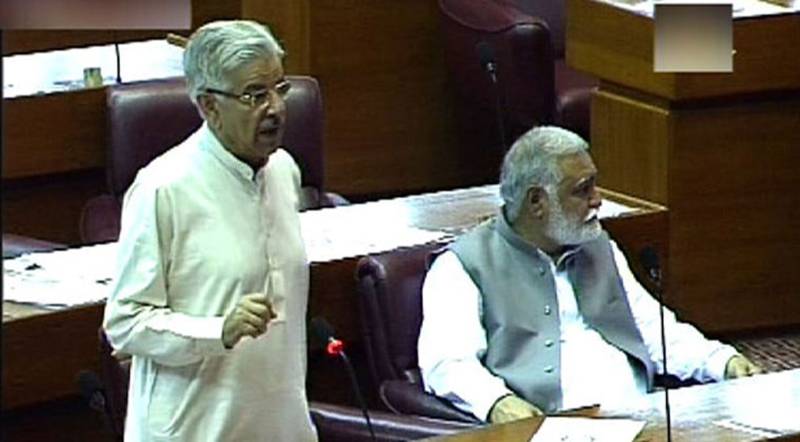ISLAMABAD - The government yesterday strongly rejected Afghan government claims that Taliban leader Mulla Omar died in Pakistan.
Defence minister Khwaja Asif told the National Assembly that he ‘neither died in Pakistan nor was buried’ here.
The government’s focus however was to resume the peace talks between the Taliban and Afghan government which are “postponed and not abandoned”, he said.
However, he avoided whether he Mulla Omar had ever operated from inside Pakistan, saying Islamabad wants to remove the impression that it had been interfering in Afghanistan affairs by playing a positive role in Afghan reconciliation.
The positive role being played by the governments of Pakistan and Afghanistan for regional peace will one day become part of history, he said. Afghan peace dialogue has been “postponed and not abandoned” and Pakistan is making efforts to get it resumed, he added.
His statement on Omar’s death marked the government’s first official response to the allegations that he died at a Karachi hospital in 2013 and was buried in Quetta.
“Mulla Omar neither died nor was buried in Karachi, Quetta or any other part of Pakistan...whether he died now or earlier, this is also a controversy and we don’t want to get involved in it,” Asif said. The statements made by Taliban’s new leader also prove that he died in Afghanistan, he said in reply to questions from PPP lawmaker Naveed Qamar.
Qamar had demanded the government that the ‘mystery’ regarding Omar’s death should be revealed, warning that it could affect the nascent reconciliation process between Taliban and Afghan government.
A day before Pakistan was to host a second round of peace talks between Afghan and Taliban negotiators, Kabul claimed last week that Omar died in Pakistan, prompting the Taliban to pull out of talks and throwing the peace process into turmoil.
The Taliban has chosen Omar’s deputy Mullah Akhtar Mansoor as its new leader, but he is facing opposition from senior leaders within the militant group and they have refused to swear allegiance to Mansoor.
Khawaja Asif said that reported leadership rivalry is also an internal matter of the Taliban and his country does not want to be involved in this controversy either.
“Our focus is to create peace and we don’t accept that we have a control on Taliban... Our role is that of a mediator,” said the minister, adding that Pakistan only wished for continuation of reconciliation process.
Pakistan People’s Party (PPP), the major opposition party in the parliament, had twice raised the issue of Mulla Omar’s death earlier but the government did not give its stance previously.
“It is our earnest desire that this process continues. Our efforts are that whichever leadership [of the Taliban] emerges that leadership continues with the process of peace and reconciliation with the Afghan government so that lasting peace can be established in the region.”
PPP’s parliamentary leader Aijaz Jhakrani, on point of order, blamed federal government for interfering in provincial matters. “Sindh is being (exclusively) targeted with the allegations of corruption,” he said, terming it a violation of provincial autonomy. “Interference without taking Sindh chief minister into confidence should be stopped,” he demanded.
MQM came down hard on government for electricity overbilling. Party lawmaker Sajid Ahmed demanded the government share the findings of committee that probed deaths of people due to heat wave in Karachi. He said government should take measures to control power outages.
PPP MNA Shazia Mari also strongly criticised government over load-shedding. “You will come to know about real miseries of people if you just spend a few hours without electricity,” said Marri, warning that they could join the protesters on the street.
Responding to non-implementation of five percent job quota for non-Muslims, Minister for Stat of Parliamentary Affiars Sheikh Aftab said government is implementing it. “After 18th amendment, the provinces are dealing with this matter,” he added.
Tuesday, November 19, 2024
Mulla Omar ‘did not die in Pakistan’
| Asif says Afghan talks not abandoned | Taliban leadership rivalry an ‘internal matter’

6:09 PM | November 18, 2024
Youth-led solutions highlighted at Climate Change Workshop in Lahore
9:07 PM | November 18, 2024
Areeba Habib advocates for tolerance after facing backlash over Diwali celebration
9:06 PM | November 18, 2024
Islamabad enforces section 144 ahead of PTI's Nov 24 protest
8:55 PM | November 18, 2024
Imran Khan calls for massive rally on Nov 24 to reclaim freedom: Aleema Khan
8:42 PM | November 18, 2024
Zulfi Bukhari, Shahbaz Gill, Murad Saeed, Hammad Azhar declared absconders by ATC
8:30 PM | November 18, 2024
-
Pakistan’s judiciary champions climate justice at COP29 in Baku
-
Pakistan’s judiciary champions climate justice at COP29 in Baku
-
Punjab struggles with persistent smog as Met Office forecast rainfall
-
Punjab residents face escalating smog crisis as pollution levels soar across country
-
Qatar says Hamas 'no longer welcome' in Gulf state
-
Allama Iqbal's birth anniversary being observed today
Stability in Sight
November 18, 2024
Police Accountability
November 18, 2024
Digital Disconnect
November 18, 2024
Agricultural Alarm
November 17, 2024
Cost of Inaction
November 17, 2024
The Law of Nations
November 18, 2024
Living in a Haze
November 18, 2024
The Impact of Graphic Content
November 18, 2024
Beating the Bush
November 18, 2024
Amazon Fire Incident
November 18, 2024
ePaper - Nawaiwaqt
Nawaiwaqt Group | Copyright © 2024





